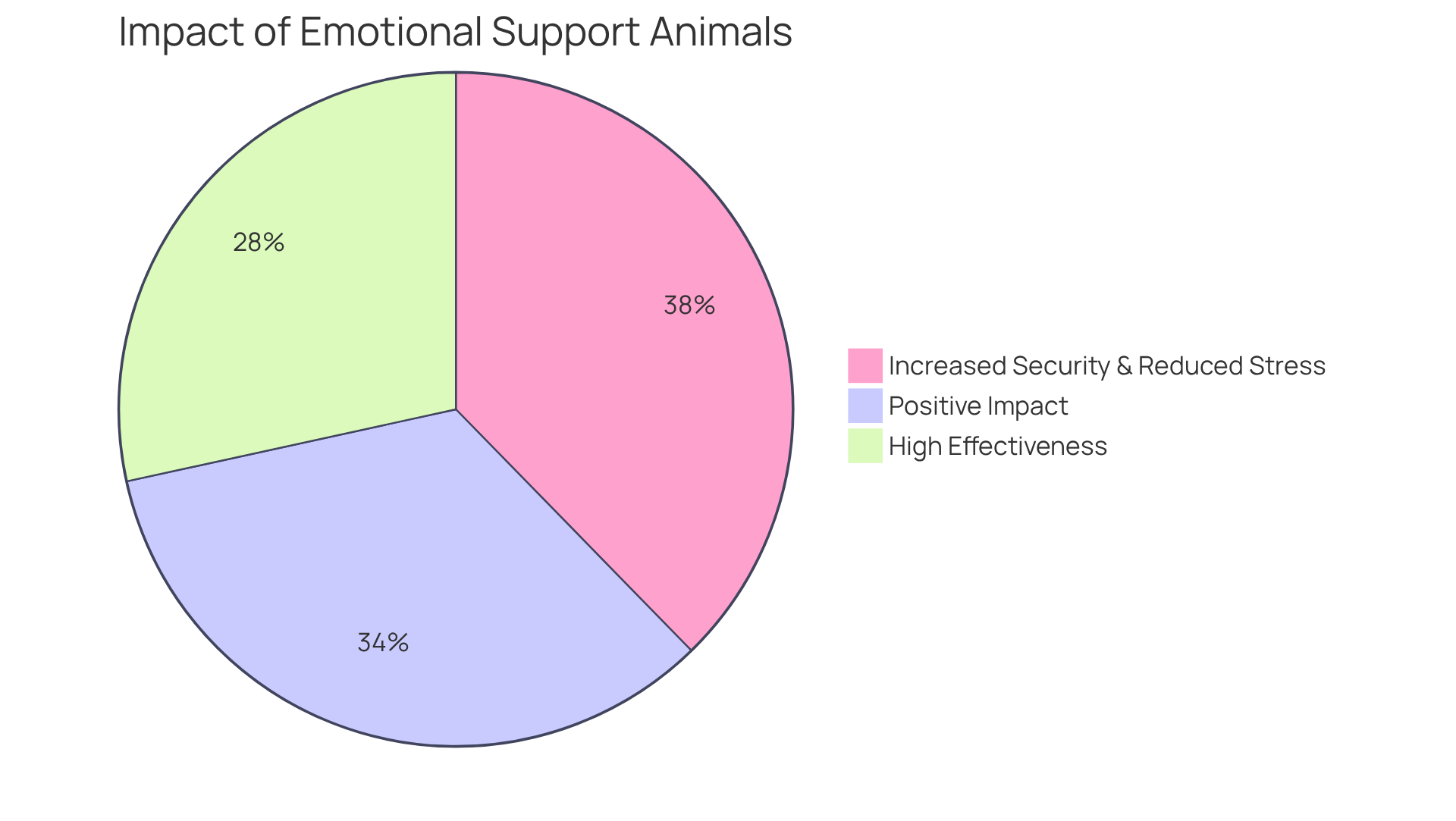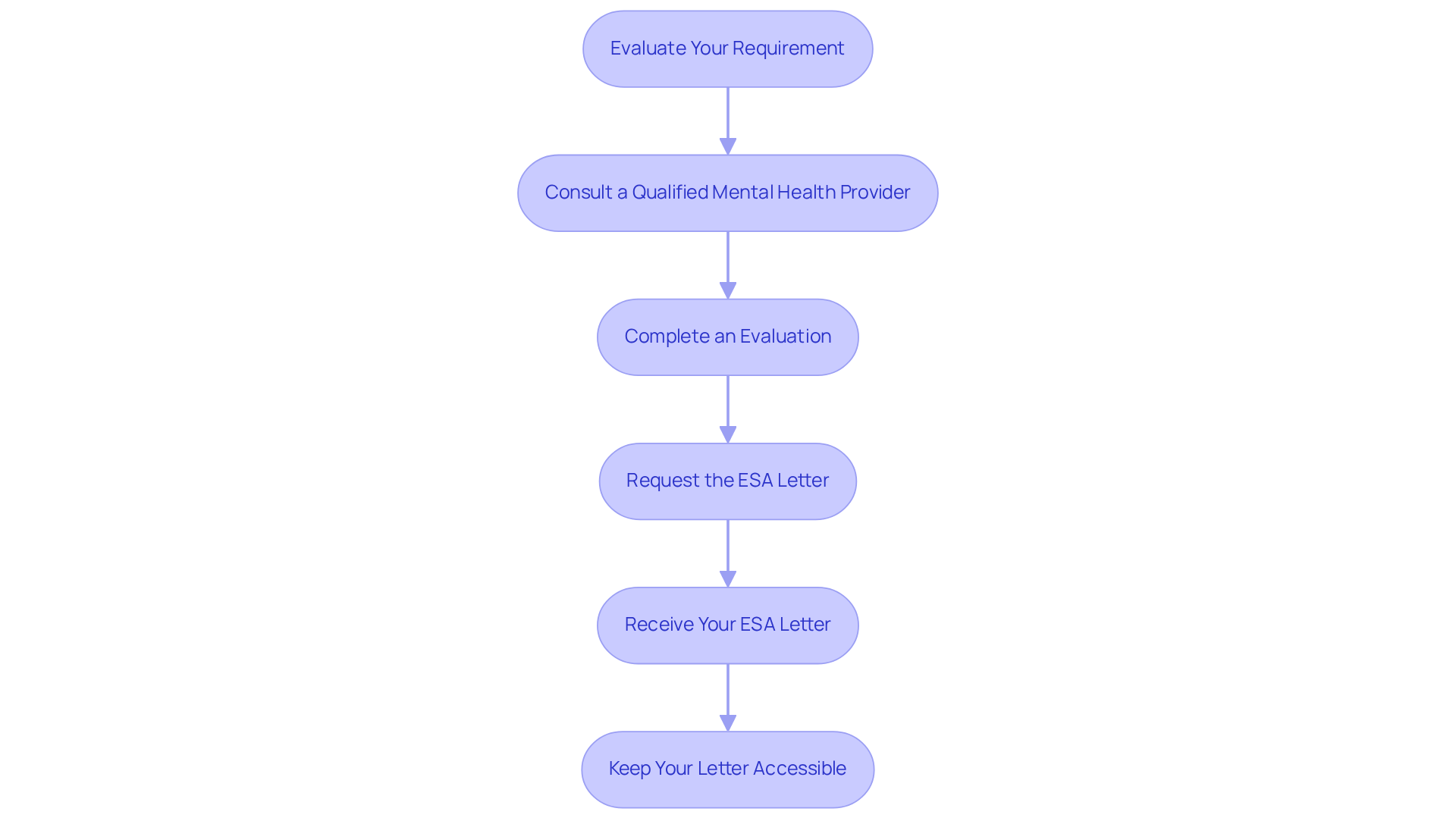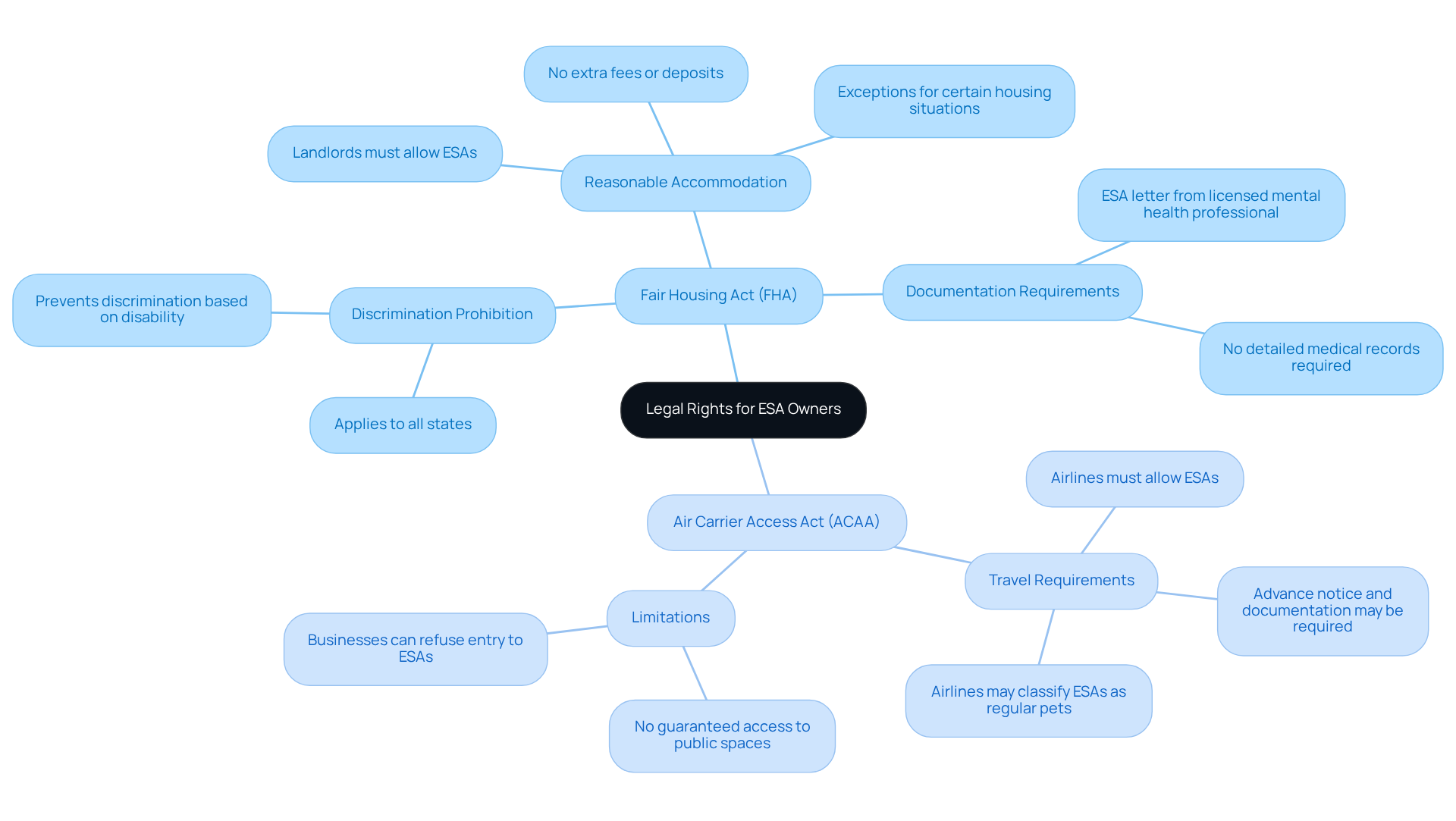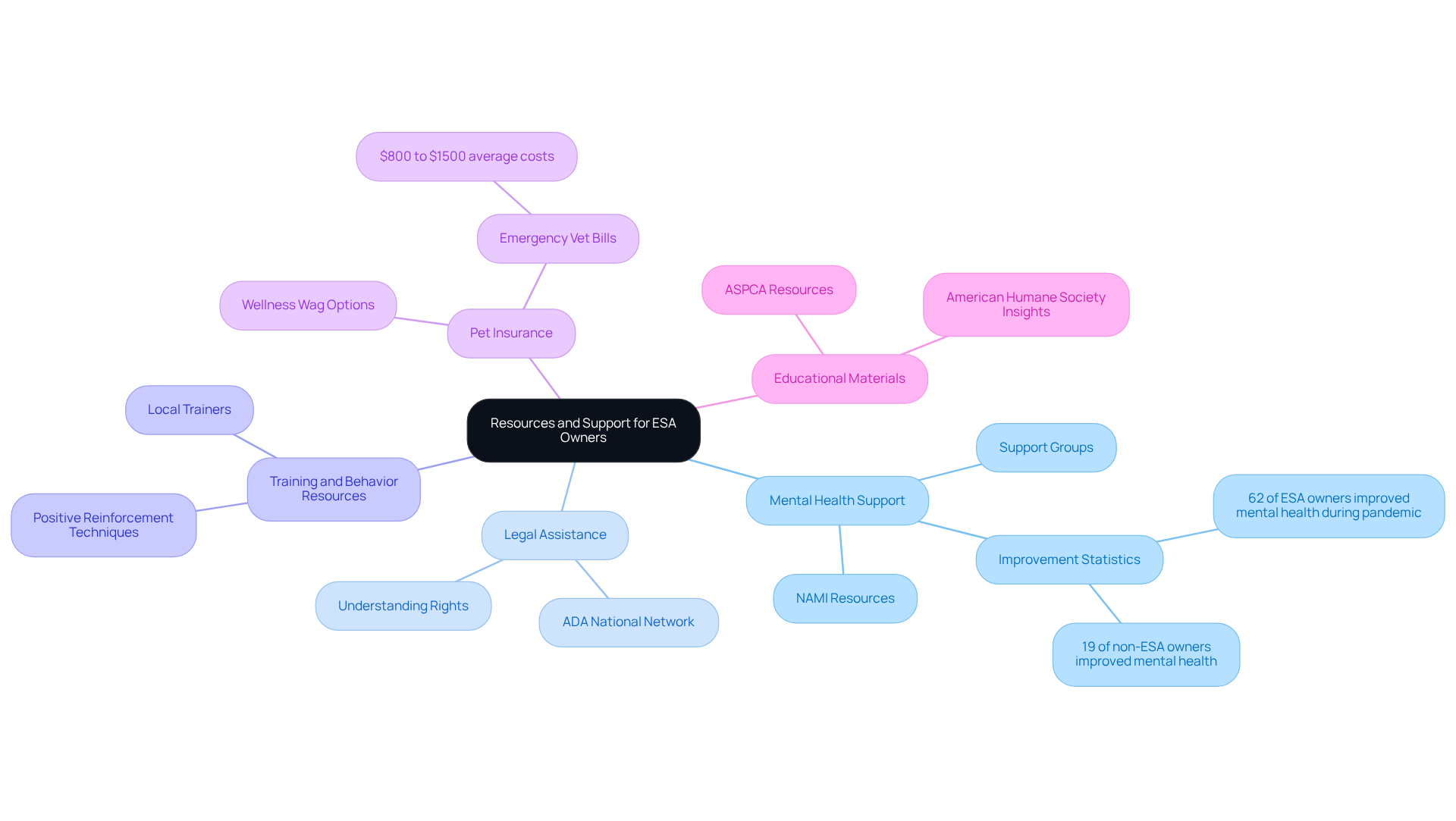

How to Make Your Animal an Emotional Support Animal: A Step-by-Step Guide
by Lena Park
Last updated: September 8, 2025
Verified and Approved by:
Angela Morris,
MSW, LCSW
Fact Checked

Overview
To make your animal an emotional support animal (ESA), it is essential to follow a thoughtful step-by-step process. This journey begins with:
- Evaluating your emotional needs
- Seeking guidance from a qualified mental health provider
- Ultimately obtaining an ESA letter that outlines the necessity of your animal for emotional well-being
Each step is crucial, as it emphasizes the importance of professional evaluation and legal documentation, which are vital for accessing rights under the Fair Housing Act and Air Carrier Access Act. These protections ensure that ESA owners can find comfort in housing and travel situations, fostering a sense of security and support.
Introduction
Emotional Support Animals (ESAs) have emerged as vital companions for individuals navigating the complexities of emotional or psychological challenges. These remarkable animals offer a unique form of support that goes beyond traditional pet ownership. Unlike service animals, which are trained for specific tasks, ESAs provide comfort and companionship, playing an essential role in alleviating symptoms of anxiety, depression, and other mental health issues.
As more people seek to understand how to make their beloved pets official emotional support animals, the process can feel overwhelming. What steps are necessary to ensure that these cherished companions can legally provide the support they are capable of?
Rest assured, there is a pathway to securing the recognition your ESA deserves, and it begins with understanding the compassionate solution of obtaining an ESA letter.
Define Emotional Support Animals and Their Role
Emotional Support Animals serve as invaluable companions for those navigating emotional or psychological challenges. Unlike service animals, which undergo extensive training for specific tasks, emotional support animals primarily offer companionship and emotional support. This connection can significantly alleviate symptoms associated with anxiety, depression, PTSD, and other psychological hurdles. For college students, the presence of an ESA can be especially comforting during high-stress periods, helping to alleviate feelings of social isolation and providing relief amid academic pressures.
Any domesticated animal, from dogs and cats to rabbits and birds, can qualify as an ESA. The bond formed between an individual and their ESA can greatly enhance emotional stability and overall quality of life. Research indicates that 87% of pet owners believe their animals positively impact their psychological well-being, with many reporting notable improvements in their emotional health. For instance, a survey revealed that 73% of ESA owners rated their pets’ effectiveness in enhancing well-being as an eight or higher on a scale of one to ten.
Moreover, studies show that individuals with emotional support animals experience increased feelings of security (99.29%) and reduced stress levels (96.80%). For those considering obtaining an ESA letter, understanding how to make an animal an emotional support animal is crucial. These remarkable companions can provide substantial help in managing the complexities of psychological challenges, offering a pathway to greater emotional resilience and support.

Follow the Steps to Obtain an ESA Letter
To obtain an ESA letter, you can follow these compassionate steps:
-
Evaluate Your Requirement: Take a moment to reflect on your emotional wellbeing. Consider how to make an animal an emotional support animal (ESA) to bring you comfort and assistance. Keeping a journal of your feelings and experiences can be a helpful tool for discussions with your healthcare provider.
-
Consult a Qualified Mental Health Provider: Arrange a meeting with a certified therapist or psychiatrist who specializes in assessing psychological needs related to emotional support animals. It’s important to find a professional who understands how to make an animal an emotional support animal and the therapeutic benefits they can provide.
-
Complete an evaluation to understand how to make an animal an emotional support animal: During your consultation, be prepared to discuss your health history and the specific ways an ESA may assist you. The evaluation will assess your eligibility based on established criteria, including recognizing your emotional or mental disability and how it affects your daily life.
-
Request the ESA Letter: If you are approved, you can formally request your ESA letter. This important document must be issued on the professional’s official letterhead and should include their license number, your diagnosis, and a clear statement explaining why the ESA is necessary for your treatment.
-
Receive Your ESA Letter: Once your letter is issued, ensure that it meets all legal requirements. In 2025, services like Wellness Wag will be able to provide your ESA letter within 24 hours, ensuring you receive timely support. This letter is vital for your rights under the Fair Housing Act, which protects your ability to live with your ESA in housing situations, as well as under the Air Carrier Access Act for travel.
-
Keep Your Letter Accessible: Store your ESA letter in a safe place, as you may need to present it to landlords or airlines when requesting necessary accommodations. Remember, Assistance Animals are only allowed within your assigned residence hall and must be fully house-trained and up to date on vaccinations. ESA letters are generally valid for one year, so keep track of renewal dates to maintain your rights under the Fair Housing Act and Air Carrier Access Act.

Understand Legal Rights and Protections for ESA Owners
As an Emotional Support Animal (ESA) owner, you have specific legal protections under federal laws, particularly the Fair Housing Act (FHA) and the Air Carrier Access Act (ACAA). Understanding these rights is essential for effectively navigating the challenges of housing and travel.
The Fair Housing Act (FHA) is a crucial law that prohibits discrimination against individuals with disabilities in housing situations. It requires landlords to offer reasonable accommodations for emotional support animals, even in properties with ‘no pets’ policies. To request this accommodation, presenting your ESA letter to your landlord is necessary, as it serves as official documentation of your need for the animal.
The Air Carrier Access Act (ACAA) facilitates travel for individuals with emotional support animals on commercial flights. While airlines must permit emotional support animals, they may have specific requirements, such as advance notice and proper documentation. Always check the airline’s policies regarding emotional support animals before traveling to ensure compliance.
It’s important to note that no official registration is required for emotional support animals. A valid ESA letter from a licensed mental health professional is sufficient to confirm your need for an emotional support animal.
However, despite the protections offered in housing and travel, emotional support animals do not have the same public access rights as service animals. Businesses have the discretion to deny entry to ESAs, making it vital for owners to know where their animals are permitted.
Recent statistics show a rising number of complaints related to ESA discrimination in housing, highlighting the importance of understanding your rights. The FHA clearly states that emotional support animals are considered a ‘reasonable accommodation’ for individuals with psychological conditions, ensuring that you can live with your ESA regardless of restrictive housing policies. Nonetheless, it is crucial to recognize that while the FHA provides significant protections, it does not apply to all housing situations, such as single-family homes rented without a real estate agent.
In summary, being informed about your legal rights under the FHA and ACAA can empower you to advocate for your needs effectively. This knowledge ensures that you and your ESA can navigate housing and travel challenges with confidence, fostering a sense of security and support in your journey.

Access Resources and Support for ESA Owners
As an ESA owner, you have access to a variety of resources and support systems designed to enhance your experience and well-being:
-
Mental Health Support: Connecting with fellow ESA owners through support groups or forums can be invaluable. Organizations like the National Alliance on Mental Illness (NAMI) offer community assistance and resources tailored to psychological needs. Many individuals find that sharing their experiences helps them feel more grounded and less anxious. In fact, 62% of ESA owners reported an improvement in their well-being during the pandemic, compared to only 19% of those without an ESA.
-
Legal Assistance: If you encounter discrimination or challenges related to your ESA, organizations such as the ADA National Network can provide guidance on your rights and legal options. As more individuals seek legal assistance for ESA-related issues, understanding your rights becomes crucial. Remember, ‘Emotional Support Animals are not merely pets—they’re essential for many individuals,’ and understanding how to make an animal an emotional support animal highlights their important role in mental wellness.
-
Training and Behavior Resources: While emotional support animals do not require specialized training, ensuring your animal behaves well in public can be beneficial. Consider seeking local trainers who specialize in positive reinforcement techniques to help your ESA thrive in various environments.
-
Pet Insurance: Enrolling your ESA in a pet insurance plan can help manage unexpected medical expenses. With 47% of pet parents facing pet-related debt and average emergency vet bills ranging from $800 to $1500, having coverage can provide peace of mind. Wellness Wag offers options that can assist you in managing your pet’s medical expenses, ensuring you’re prepared for any unexpected situations.
-
Educational Materials: Familiarizing yourself with the benefits of ESAs and proper care through books and articles is essential. Resources from the ASPCA and the American Humane Society offer valuable insights into pet care and the emotional support animals provide.
In addition to these resources, Wellness Wag offers a streamlined process for teaching clients how to make an animal an emotional support animal through personalized consultations with licensed medical physicians. After submitting the required forms, you will connect with a licensed medical doctor for a thorough evaluation to assess your eligibility for an ESA. Upon confirmation, you’ll receive a professionally crafted ESA letter with legal recognition within 24 hours of your consultation.
Support groups can significantly benefit ESA owners by fostering a sense of community and shared experience. Engaging with these resources not only enhances the quality of life for ESA owners but also reinforces the vital role that emotional support animals play in mental health care.

Conclusion
Emotional Support Animals (ESAs) play a vital role in enhancing the emotional well-being of individuals grappling with psychological challenges. These animals offer companionship and comfort, helping to alleviate symptoms of anxiety, depression, and other mental health issues. For many, they are invaluable companions. Understanding how to designate an animal as an emotional support animal is essential for those seeking to harness the therapeutic benefits these pets can provide.
This article outlines the necessary steps to obtain an ESA letter, highlighting the importance of consulting a qualified mental health professional and understanding legal rights under the Fair Housing Act and the Air Carrier Access Act. Key insights include:
- The evaluation process
- The significance of a valid ESA letter
- The resources available for ESA owners, such as mental health support, legal assistance, and training options
Each of these elements contributes to a comprehensive understanding of the rights and responsibilities associated with owning an ESA.
Ultimately, the journey to obtaining an emotional support animal transcends legalities and paperwork; it’s about nurturing a connection that can profoundly enhance mental health and quality of life. Individuals are encouraged to explore the available resources and support systems, engage with communities of fellow ESA owners, and advocate for their rights. This ensures that their emotional support animals can be a source of comfort in their lives. By embracing the transformative impact of ESAs, one can navigate the complexities of mental health challenges with greater resilience and support.
Frequently Asked Questions
What are Emotional Support Animals (ESAs)?
Emotional Support Animals are companions that provide emotional support to individuals facing emotional or psychological challenges, helping to alleviate symptoms associated with conditions like anxiety, depression, and PTSD.
How do Emotional Support Animals differ from service animals?
Unlike service animals, which are trained for specific tasks, Emotional Support Animals primarily offer companionship and emotional support without undergoing extensive training.
Who can benefit from having an Emotional Support Animal?
Individuals, particularly college students, can benefit from ESAs, especially during high-stress periods, as they help reduce feelings of social isolation and provide relief from academic pressures.
What types of animals can qualify as Emotional Support Animals?
Any domesticated animal, including dogs, cats, rabbits, and birds, can qualify as an Emotional Support Animal.
What impact do Emotional Support Animals have on psychological well-being?
Research indicates that 87% of pet owners believe their animals positively impact their psychological well-being, with many reporting significant improvements in their emotional health.
How effective are Emotional Support Animals in enhancing well-being?
A survey revealed that 73% of ESA owners rated their pets’ effectiveness in enhancing well-being as an eight or higher on a scale of one to ten.
What are some benefits reported by individuals with Emotional Support Animals?
Individuals with ESAs report increased feelings of security (99.29%) and reduced stress levels (96.80%).
What should someone consider when obtaining an ESA letter?
It is crucial to understand the process of making an animal an Emotional Support Animal when considering obtaining an ESA letter.
Certify Your Emotional Support Animal Today

Why You Can Rely on Us?
At Wellness Wag, we believe your pet deserves care rooted in both science and compassion. Each article is carefully researched, written in clear language for pet owners, and then reviewed by qualified professionals to ensure the information is evidence-based, current, and practical for real-life care. Our goal is to help you feel confident in making informed decisions about your pet’s health and well-being.
Reviewed by
Angela Morris, MSW, LCSW
Angela is a licensed clinical social worker with 20 years of experience in patient advocacy and community mental health. She has assisted numerous clients with ESA evaluations and brings a deep understanding of disability accommodations, ensuring that all information is accurate, supportive, and practical.

Written by :
Lena Park
Last Updated :
September 8, 2025












